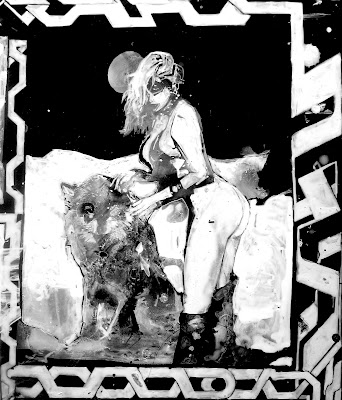Seven years ago, when I first started to click and google my way into the online RPG community, here’s what I (like most people) saw:
1. Hundreds of people who were trying—often quaintly, sometimes dazzlingly, always earnestly and by-and-large without the huge professional benefit that a successful gamble on student loans had given me in the way of an expensive art education—to make some creative things.
2. Hundreds of people on messageboards and blog comments trying--by any means necessary and with no holds-barred or fact-checking--to make doing that as painful as possible
3. The more daring and interesting a thing was, the more aggressively thing #2 happened
…and have no doubt: it worked. A great deal of middle-of-the-road stuff was being published while the best stuff languished on blogs or in obscure corners of still-obscurer forums.
When I started this blog, folks would write in, asking questions about which way to take their projects, always including “I want to_____ but I’m afraid people will say _____ “.
This isn't just about hurt feelings, either, in an online scene where the only way to make a profit is to get your project talked about: making a sustainable living requires attracting hate speech. To a far larger degree than in non-nerd media.
Here were people not recognized as artists in any sense, not influential to anyone, with mortgages or student loans or both, working tech jobs or at banks or biscuit factories, trying in the few hours between commute and sleep to do new things but sure of only one thing: they would get attacked for it. And whatever -ism the attack involved would be forever attached to their name on the internet as the price of trying to be creative.
Trolls are not a government. This wasn’t censorship or directly free speech issue—and people should not use those terms. What post-fact criticism in volume does isn’t censor, what it does is raise the cost of being creative.
The problem is not so simple as criticism or censorship being good or bad--the issue in small online creative communities is about when the cost of being creative is higher than the cost of lying (or, to be very charitable, talking without googling a single word of what you're on about first.)
_________
A lot of the attacks on people like James Edward Raggi at LOTFP, at Stacy Dellorfano at Contessa, and like me presume that the internet controversies we were involved in are somehow failures of professionalism or decorum—mistakes, brand-damaging eruptions of resentment, lashing-out, rants, screeds penned against better judgment.
In fact, they’re nothing of the sort. I am proud of every stand I ever took and I suspect so are they.
When a white person attacked an artist of color for daring to make pin-up art, fighting back made the RPG community better.
When designers attacked Contessa for only having games run by women and erased the involvement of trans women in Contessa, fighting back made the RPG community better.
When a mom claimed that the D&D With Porn stars girls appearing in a magazine was bad for women, fighting back made the RPG community better.
When a bunch of dudes without facts told Shanna Germain her space succubus was sexist, fighting back made the RPG community better.
When the same dudes told a trans woman a trans character in a game she co-wrote was transphobic, fighting back made the RPG community better.
When groups of designers started a years-long thread behind a paywall dedicated to harassing other designers, fighting back made the RPG community better.
When the girls and I quit working with a company because they hired a transphobic commentator and people attacked us for it, fighting back made the RPG community better.
When a designer lied about rape to frame another designer, fighting back made the RPG community better.
When a designer accused a movie he’d never seen of vast moral crimes despite never having seen it, fighting back and pointing that out made the RPG community better.
When a designer claimed a rival he didn't like was secretly courting Nazis, fighting back made the RPG community better.
When an asexual, married, cis-presenting mom with a kid falsely claimed she suffered more homophobia than the LGBT game designers criticizing her, fighting back made the RPG community better.
When a dad claimed that Kingdom Death was somehow hurting his daughter while ignoring the feminists who were calling him out, fighting back made the RPG community better.
When major game designers, publishers and gadflies casually support these wild claims, fighting back makes the RPG community better.
The controversies are not proof of having done something wrong, they are proof of having done something right. Before people started taking a stand in the post-internet RPG scene, basically nothing good was getting published. Now that people have, it’s an embarrassment of riches.
Everyone who took a moral stand in any of these incidents has lowered the cost of being creative by proving to creators that the honest elements of the game community have their back and by proving we want to raise the cost of lying.
But the cost of being creative is not yet zero: my co-author Sarah Horrocks has responded to recent attacks by cishet dudes on RPGnet by saying she’ll never work in games again. That avenue for exposure and side income has been denied this particular up-and-coming trans creator. Not a single one of the folks who attacked her work has been forced to make a similar announcement.
As long as the people who can do that pay less of a price than the people who stick their necks out by trying to change what we are allowed to see and read and play, there will alway be a need for ”drama”—no matter how unpleasant that word is.
Those of us privileged enough to be able to tank in these fights can and should. The maker of things is sometimes innocent, the liar never is.
-
-
-












































